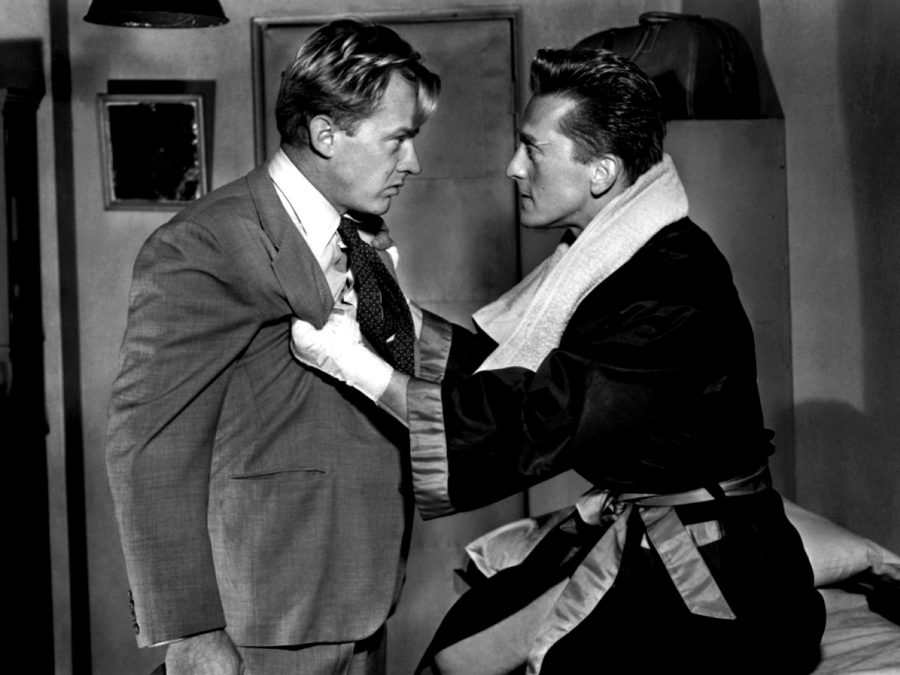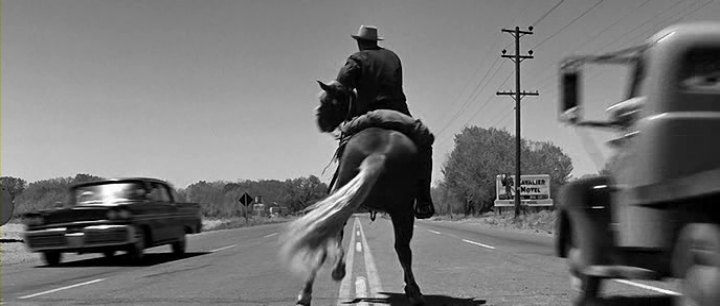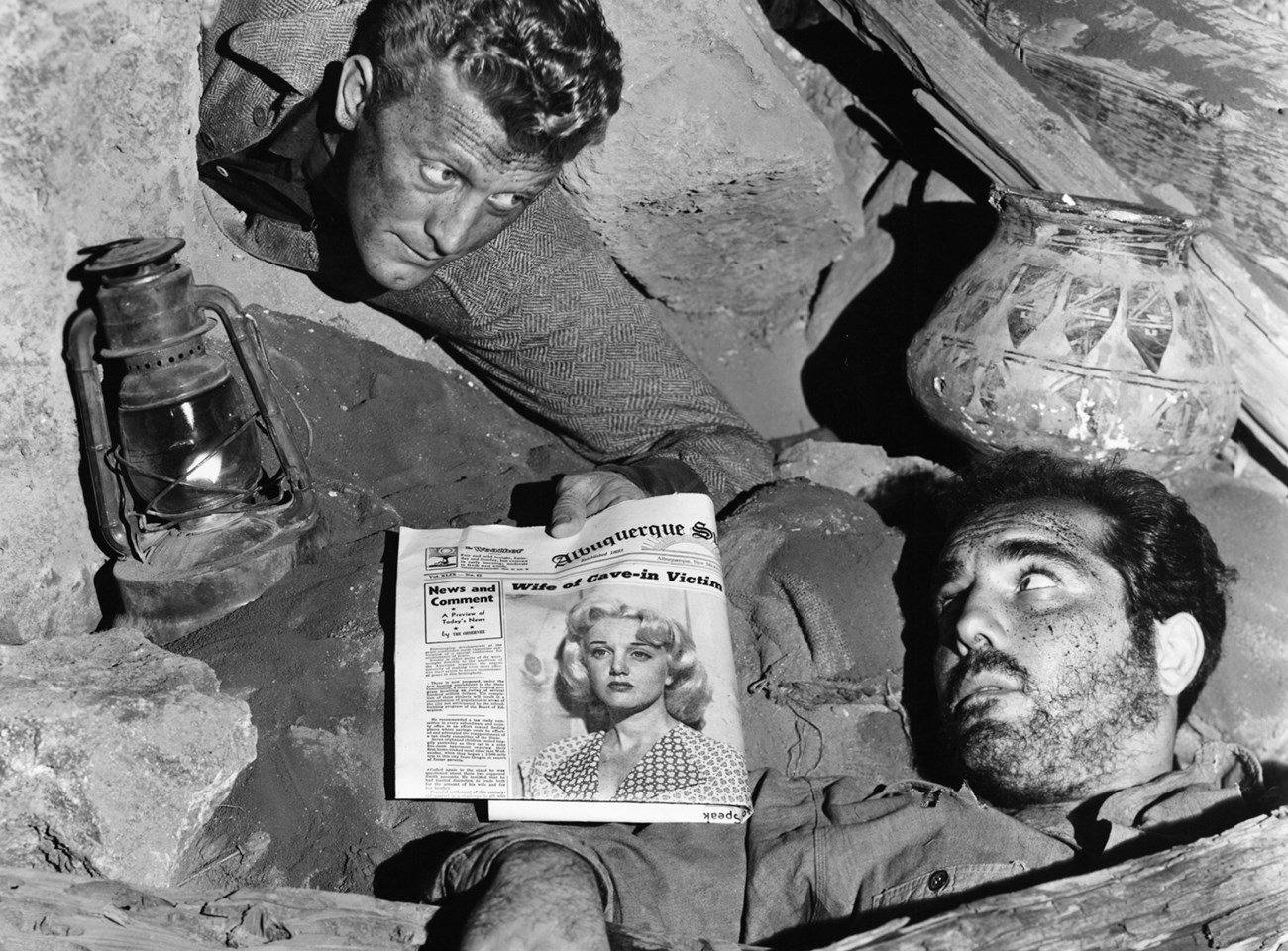
The ten best films of Kirk Douglas - Part I
Frank Black
8 February 2020
This is a bit of modified a rehash of post from a couple of years back. And your point is?
Is there another actor where a histrionic impersonation has replaced the real thing in the minds of the public? There's a tendency to forget just how great Douglas could be on the screen and the occasion of his death seems like an excuse - not that any is needed - to remind you.... Though being FNB readers, the assumption is that you already have class, taste and style and that you're already aware of this. Still, for the Philistines and Burt Lancaster fans out there, here we go (in particular order, of course... )

Out of the Past (1947)
Only Douglas' second movie, Jacques Tourneur's tale has all the hallmarks of classic film noir: chiaroscuro cinematography, a beautiful femme fatale and a hapless protagonist caught up in a dark labyrinthine plot. Honest but compromised ex-PI Jeff Bailey/Markham (Robert Mitchum) gets caught up in a web of crime and deceit as his past, in the shape of mobster Douglas and his double-crossing girlfriend, Janet Greer, comes back to haunt him. The film is beautifully shot by Nicholas Musuraca, the cinematographer on Tourneur's horror classic, Cat People, and expressionist lighting and mise-en-scène are used to great effect. Stop the movie at almost any point and you have a great still photograph. On top of this, all the cast are on great form (especially Mitchum). Probably my favourite noir.

Champion (1946)
Boxing movies were a 'thing' long before Rocky and Raging Bull. Think of Edward G. Robinson in Kid Galahad (1937), Wallace Beery in The Champ (1931) or Robert Wise's The Set-Up (1949), wherein a has-been boxer, Robert Ryan, fights for his integrity at a terrible cost. The same year as the latter, Mark Robson - like Tourneur and Wise, another associate of producer Val Lewton - and screenwriter Carl Foreman, brought us the story of Midge Kelly (Douglas, who won an Oscar nomination), whose determined rise from vagrancy to boxing champion comes at the expense of anyone else around him, including those on whom he has relied for help.

Champion (1946)
Boxing movies were a 'thing' long before Rocky and Raging Bull. Think of Edward G. Robinson in Kid Galahad (1937), Wallace Beery in The Champ (1931) or Robert Wise's The Set-Up (1949), wherein a has-been boxer, Robert Ryan, fights for his integrity at a terrible cost. The same year as the latter, Mark Robson - like Tourneur and Wise, another associate of producer Val Lewton - and screenwriter Carl Foreman, brought us the story of Midge Kelly (Douglas, who won an Oscar nomination), whose determined rise from vagrancy to boxing champion comes at the expense of anyone else around him, including those on whom he has relied for help.

Lonely Are the Brave (1962)
Douglas' own favourite film and surely the inspiration for Randy Newman's song, Cowboy, seems like an elegy for on the dying of the myth of the American West and should be right up there with the likes of Ford's The Man Who Shot Liberty Valance and the Western films of Sam Peckinpah. He's Jack Burns, an anachronistic modern-day cowboy drifter trying to live the same way as his predecessors did almost 100 years earlier, but heading for a tragic end. Scripted by blacklisted writer Dalton Trumbo, it might sound a bit Trumpian now in its celebration of the individual but it's really a meditation on the struggle against conformity, a not uncommon theme in American films of the Cold War and beyond (see High Noon or Easy Rider, for example).

Ace in the Hole (1951)
Pre-dating Alexander Mackendrick's The Sweet Smell of Success by six years, Billy Wilder's withering attack on journalistic scruples is as relevant today as it ever was. Douglas is terrific (in both senses of the word) as Chuck Tatum a disgraced, egotistical reporter who will do anything for a good story. In this case, he ruthlessly exploits a man trapped in a collapsed mine tunnel so he can have exclusive coverage, to the extent of impeding rescue attempts that would have saved the victim.

Paths of Glory (1957)
Possibly my favourite Kubrick film, this searing anti-war work contains one of Douglas' best performances as Colonel Dax, who fights to protect his soldiers against charges of cowardice during a French World War I offensive. Dax has to take on the remote, arrogant and smug generals who are hanging on to past glories and among whom logic and compassion have no place. Douglas had been impressed by Kubrick's The Killing and contacted him about working together. Kubrick responded by sending him the script for Paths of Glory, based on a novel by Humphrey Cobb, and the actor used his star power to get funding from United Artists, though he rightly thought it wouldn't be a success with the public - perhaps more so because he demanded that Kubrick remove the more optimistic ending that he's grafted on to the story in the hope of appealing to the public. In France, it was heavily criticised by the military and wasn't released there until 1975; it was banned by Franco's government in Spain and not shown until 1986; American military bases in the USA and overseas refused to show the film; it was even banned in Switzerland until 1979 for its criticism of the French military and judicial systems. It was, however, a huge critical success and led to Douglas working with again with Kubrick, this time on Spartacus.
Douglas' own favourite film and surely the inspiration for Randy Newman's song, Cowboy, seems like an elegy for on the dying of the myth of the American West and should be right up there with the likes of Ford's The Man Who Shot Liberty Valance and the Western films of Sam Peckinpah. He's Jack Burns, an anachronistic modern-day cowboy drifter trying to live the same way as his predecessors did almost 100 years earlier, but heading for a tragic end. Scripted by blacklisted writer Dalton Trumbo, it might sound a bit Trumpian now in its celebration of the individual but it's really a meditation on the struggle against conformity, a not uncommon theme in American films of the Cold War and beyond (see High Noon or Easy Rider, for example).

Ace in the Hole (1951)
Pre-dating Alexander Mackendrick's The Sweet Smell of Success by six years, Billy Wilder's withering attack on journalistic scruples is as relevant today as it ever was. Douglas is terrific (in both senses of the word) as Chuck Tatum a disgraced, egotistical reporter who will do anything for a good story. In this case, he ruthlessly exploits a man trapped in a collapsed mine tunnel so he can have exclusive coverage, to the extent of impeding rescue attempts that would have saved the victim.

Paths of Glory (1957)
Possibly my favourite Kubrick film, this searing anti-war work contains one of Douglas' best performances as Colonel Dax, who fights to protect his soldiers against charges of cowardice during a French World War I offensive. Dax has to take on the remote, arrogant and smug generals who are hanging on to past glories and among whom logic and compassion have no place. Douglas had been impressed by Kubrick's The Killing and contacted him about working together. Kubrick responded by sending him the script for Paths of Glory, based on a novel by Humphrey Cobb, and the actor used his star power to get funding from United Artists, though he rightly thought it wouldn't be a success with the public - perhaps more so because he demanded that Kubrick remove the more optimistic ending that he's grafted on to the story in the hope of appealing to the public. In France, it was heavily criticised by the military and wasn't released there until 1975; it was banned by Franco's government in Spain and not shown until 1986; American military bases in the USA and overseas refused to show the film; it was even banned in Switzerland until 1979 for its criticism of the French military and judicial systems. It was, however, a huge critical success and led to Douglas working with again with Kubrick, this time on Spartacus.
Part II soon...









No comments:
Post a Comment